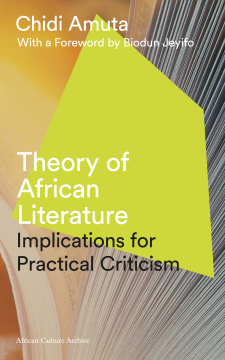
Additional Information
Book Details
Abstract
This groundbreaking work, first published in 1989, was one of the first to challenge the conventional critical assessment of African literature, and remains highly influential today.
Amuta's key argument is that African literature can be discussed only within the wider framework of the dismantling of colonial rule and Western hegemony in Africa. In exploring the possibility of a dialectical, alternative critical base, he draws upon both classical Marxist aesthetics and the theories of African culture espoused by Fanon, Cabral and Ngugi. From these explorations, Amuta derives a new language of criticism, which is then applied to works by modern African writers as diverse as Achebe, Ousmane, Agostinho Neto and Dennis Brutus.
Amuta's highly original and innovative approach remains relevant not only for assessing the literature of developing countries, but for Marxist and postcolonial theories of literary criticism more generally. The author's elegance of argument and clarity of exposition makes this a distinguished and lasting contribution to debates around cultural expression in postcolonial Africa.
‘Amuta’s monograph remains irreplaceable in being the very first systematic attempt to give us a cognitive map of where African literary theory came from.’
Biodun Jeyifo, from the Foreword
Chidi Amuta is a Nigerian journalist, intellectual and literary critic. He was previously a senior lecturer in literature and communications at the universities of Ife and Port Harcourt. He is also chaitman of the editorial board for the Nigerian Daily Times.
Biodun Jeyifo is a professor of African and African American studies and of comparative literature at Harvard University. His previous books include Wole Soyinka: Politics, Poetics, Postcolonialism (2004).
Table of Contents
| Section Title | Page | Action | Price |
|---|---|---|---|
| Cover | Cover | ||
| About the Author | iii | ||
| Title Page | v | ||
| Copyright | vi | ||
| Dedication | vii | ||
| Contents | ix | ||
| Foreword by Biodun Jeyifo | xi | ||
| Preface | xv | ||
| Introduction | 1 | ||
| 1. Ideological Formations in the Criticism of African Literature | 12 | ||
| Criticism, Ideology and Society: A Dialectical Overview | 13 | ||
| The Class Position of the Critic | 16 | ||
| Aspects of Bourgeois Criticism | 18 | ||
| Notes | 31 | ||
| 2. Traditionalism and the Quest for an African Literary Aesthetic | 33 | ||
| The Intellectual Climate | 34 | ||
| An African World View: Illusion or Reality? | 37 | ||
| Pitfalls of Traditionalist Aesthetics | 41 | ||
| Notes | 50 | ||
| 3. Marxism and African Literature | 52 | ||
| Marxist Aesthetics: An Open-ended Legacy | 52 | ||
| Politics and Ideology in African Literature | 56 | ||
| African Literature and the National Question | 61 | ||
| The Class Question: African Literature or Literature of the African People? | 68 | ||
| Beyond Orthodox Marxism: The Framework for a Post-Marxist Theory of African Literature and Culture | 72 | ||
| Notes | 75 | ||
| 4. A Dialectical Theory of African Literature: Categories and Springboards | 77 | ||
| Dialectics and Cultural Theory | 77 | ||
| Categories for a Dialectical Theory of African Literature | 80 | ||
| Springboards for a Dialectical Theory of African Literature and Culture | 89 | ||
| Notes | 100 | ||
| 5. Issues and Problems in African Literature: A Dialectical Revision | 103 | ||
| African Literature: Beyond Definition | 104 | ||
| African Literature and its Audience | 107 | ||
| The Language Question | 112 | ||
| Commitment and Alignment | 114 | ||
| Continuities from the Past | 117 | ||
| Aesthetics and Critical Values | 120 | ||
| The Limits of Literature | 121 | ||
| Implications for Practical Criticism | 122 | ||
| Notes | 123 | ||
| 6. History and the Dialectics of Narrative in the African Novel | 125 | ||
| Problems in the Sociology of the African Novel | 125 | ||
| The Materialism of Cultural Nationalism: Achebe's Things Fall Apart and Arrow of God | 130 | ||
| Proletarian Consciousness and the Anti-Colonial Struggle: Ousmane's God's Bits of Wood | 136 | ||
| Class Struggle and the Socialist Vision: Ngugi's Petals of Blood | 143 | ||
| Notes | 152 | ||
| 7. Drama and Revolution in Africa | 154 | ||
| Politics and Ideology in Contemporary African Drama: Theoretical Observations | 154 | ||
| Historical Reconstruction and Class Struggle in Anti-Imperialist Drama: The Trial of Dedan Kimathi and I Will Marry When I Want | 157 | ||
| Contemporary Contradictions and the Revolutionary Alternative: Once Upon Four Robbers and Morountodun | 167 | ||
| Notes | 174 | ||
| 8. Poetry and Liberation Politics in Africa | 176 | ||
| Poetry and Politics: The Dialectic of Commitment | 176 | ||
| The Poetic Essence of National Liberation: Agostinho Neto's Sacred Hope | 185 | ||
| Poetry as Political Polemic: Odia Ofeimun's The Poet Lied | 191 | ||
| Notes | 195 | ||
| 9. Beyond Decolonization | 197 | ||
| Select Bibliography | 200 | ||
| Index | 205 |
